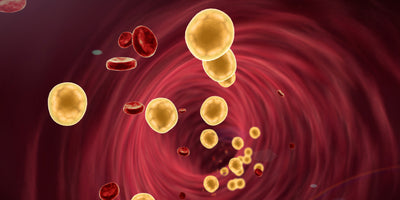
Essential Minerals for Health: The Role of Electrolytes in Maintaining Vitality
Introduction to Essential Minerals and Electrolytes
The journey towards achieving optimal health and vitality is multifaceted, involving a balanced diet, regular exercise, and the often overlooked aspect of micronutrient management. Among these micronutrients, essential minerals and electrolytes stand out for their pivotal roles in the body's physiological functions. These minerals are not just components of a healthy diet; they are the very building blocks of our body's functionality, ensuring everything from muscle contractions to nerve signaling operates smoothly.
Electrolytes, a subset of these essential minerals, include sodium, potassium, calcium, magnesium, chloride, phosphate, and bicarbonate. Each plays a unique role in maintaining homeostasis—a state of steady internal, physical, and chemical conditions maintained by living systems. For instance, calcium is vital for bone health and muscle function, while potassium and sodium are key for nerve function and fluid balance. The balance of these electrolytes in our bodies is crucial; even slight deviations can lead to significant health issues, ranging from dehydration to more severe conditions like arrhythmias or bone disorders.
Understanding the importance of these minerals and how to manage their levels in our body is not just for athletes or those with specific health conditions. It's essential knowledge for anyone aiming to maintain or improve their health. As we delve deeper into the functions of individual electrolytes, the goal is to provide you with the knowledge to make informed choices about your diet and lifestyle, ensuring your electrolyte balance supports rather than hinders your health and vitality.
Understanding Electrolytes
Electrolytes are minerals in your body that carry an electric charge. They are found in your blood, urine, tissues, and other body fluids. Electrolytes are crucial for a number of bodily functions; they help to regulate nerve and muscle function, hydrate the body, balance blood acidity and pressure, and help rebuild damaged tissue. The major electrolytes within the body include sodium, potassium, calcium, magnesium, chloride, phosphate, and bicarbonate.
- Sodium is essential for maintaining fluid balance and is critical for nerve and muscle function. However, excessive sodium intake can lead to high blood pressure, which is a risk factor for heart disease.
- Potassium plays a key role in heart function, muscle contraction, and nerve signaling. It works closely with sodium to maintain fluid balance and helps to counteract the effects of excessive sodium consumption.
- Calcium is the most abundant mineral in the body and is vital for bone health, muscle function, and nerve signaling. It plays a role in blood clotting and the regulation of heart rhythms.
- Magnesium is involved in over 300 enzymatic reactions, including protein synthesis, muscle and nerve function, blood glucose control, and blood pressure regulation. It also contributes to the structural development of bone.
- Chloride works with sodium to maintain fluid balance and is essential for the production of stomach acid, necessary for the digestion of food.
- Phosphate is involved in the formation of bones and teeth, helps manage energy storage and usage, and is a component of cell membranes, contributing to cell function and structure.
- Bicarbonate helps maintain the body's pH balance, ensuring it does not become too acidic or too alkaline.
The balance of these electrolytes is meticulously regulated by the kidneys and various hormonal pathways, including those that involve aldosterone (which helps regulate sodium and potassium levels) and parathyroid hormone (which helps regulate calcium levels). An imbalance in electrolytes can lead to various symptoms, depending on which electrolyte is out of balance and whether the level is too high or too low. Symptoms can range from fatigue, headache, and muscle cramps to more serious conditions such as arrhythmias for potassium or seizures for sodium.
Maintaining a balanced electrolyte level is thus essential for health and vitality. It supports the body's myriad functions, from muscle contraction and nerve transmission to hydration and maintaining a healthy pH balance. As we move forward, understanding the impact of electrolyte imbalance, sources of essential minerals, and strategies for maintaining a healthy balance will empower you to take control of your health through informed dietary and lifestyle choices.
The Impact of Electrolyte Imbalance

Electrolyte imbalance occurs when the levels of electrolytes in your body are either too high or too low. This imbalance can affect various bodily functions, leading to a range of symptoms that can impact an individual's health and well-being significantly. Understanding the causes, symptoms, and effects of electrolyte imbalance is crucial for maintaining optimal health.
Causes of Electrolyte Imbalance
Electrolyte imbalances can be caused by a variety of factors, including:
- Fluid Loss: Excessive sweating, vomiting, diarrhea, and high fever can lead to significant fluid loss, resulting in a depletion of electrolytes.
- Chronic Health Conditions: Diseases such as kidney disease, diabetes, and hormonal imbalances can affect the body's ability to maintain electrolyte levels.
- Diet: An imbalanced diet lacking in essential nutrients or an excess intake of sodium can disrupt electrolyte balance.
- Medications: Certain medications, including diuretics and laxatives, can affect electrolyte levels.
Symptoms of Electrolyte Imbalance
The symptoms of an electrolyte imbalance can vary widely depending on which electrolyte is out of balance and whether the level is too high or too low. Common symptoms include:
- Fatigue and Weakness
- Nausea and Vomiting
- Headache and Confusion
- Muscle Cramping and Weakness
- Irregular Heartbeat
Severe electrolyte imbalances can lead to life-threatening conditions such as seiroures, coma, and cardiac arrest.
Effects on Health
Electrolyte imbalances can have a profound effect on health, influencing everything from muscle function and nerve signaling to hydration and blood acidity. For example, a potassium imbalance can lead to heart rhythm disturbances, while a severe calcium imbalance can cause tetany, characterised by muscle cramps and spasms.
Sources of Essential Minerals and Electrolytes
Maintaining a balanced diet is key to ensuring an adequate intake of essential minerals and electrolytes. Here are some natural food sources and tips for incorporating these nutrients into your diet.
Natural Food Sources
- Sodium: Found in table salt, processed foods, and naturally in foods like celery and beets. While necessary, it's important to consume sodium in moderation.
- Potassium: Rich sources include bananas, oranges, potatoes, and spinach. Potassium is vital for heart health and muscle function.
- Calcium: Dairy products, fortified plant-based milks, kale, and almonds are excellent calcium sources for bone health and muscle function.
- Magnesium: Found in nuts, seeds, whole grains, and green leafy vegetables. Magnesium supports over 300 biochemical reactions in the body.
- Chloride: Mostly obtained from salt (sodium chloride) but also present in seaweed, tomatoes, and celery.
- Phosphate: Present in dairy products, meat, and whole grains, playing a critical role in cell function.
- Bicarbonate: While not typically obtained directly from the diet, fruits and vegetables can help maintain bicarbonate levels by promoting kidney health.
Supplements
While food sources are the best way to obtain electrolytes, supplements can be beneficial in some cases, especially for individuals with specific health conditions or athletes with high electrolyte loss. It's important to consult a healthcare provider before starting any supplement regimen.
Incorporating a variety of these foods into your diet can help ensure a balanced intake of essential minerals and electrolytes, supporting overall health and vitality. Paying attention to your body's signals and adjusting your diet accordingly can help maintain this balance and prevent the adverse effects of electrolyte imbalance.
Electrolytes and Physical Activity
The relationship between electrolytes and physical activity is a critical aspect of both performance and recovery for athletes and fitness enthusiasts alike. During exercise, the body loses fluids and electrolytes through sweat. This loss needs to be replenished to maintain optimal health and physical performance.
Importance of Electrolyte Replenishment
- Preventing Dehydration: Adequate electrolyte levels help retain fluids, preventing dehydration.
- Muscle Function: Electrolytes like potassium and calcium are vital for muscle contractions. Imbalances can lead to cramps and decreased strength.
- Nerve Function: Electrolytes facilitate nerve impulse transmission, essential for coordinating muscle movements and reflexes.
Strategies for Maintaining Electrolyte Balance During Physical Activity
- Hydration: Drinking fluids with electrolytes before, during, and after exercise can help maintain balance.
- Electrolyte-Rich Foods: Incorporating bananas, dairy, or electrolyte-enriched foods in your diet can replenish lost nutrients.
- Supplementation: In cases of intense or prolonged exercise, electrolyte supplements or sports drinks can be beneficial.
Hydration and Electrolyte Balance
Hydration plays a pivotal role in maintaining electrolyte balance. Water is the medium through which electrolytes are transported within the body, facilitating their various functions.
The Link Between Hydration and Electrolytes
- Fluid Balance: Electrolytes help regulate the body's fluid balance by directing water to the areas where it's most needed.
- Impact of Dehydration: Without adequate hydration, electrolyte concentrations can become too high, leading to imbalances and potentially affecting health.
Tips for Maintaining Optimal Fluid and Electrolyte Levels
- Consistent Fluid Intake: Drinking water throughout the day is vital, especially before, during, and after exercise.
- Mindful Eating: Consuming a balanced diet rich in electrolyte-containing foods supports hydration and nutrient replenishment.
- Monitor Hydration Status: Pay attention to thirst signals and changes in urine color as indicators of hydration levels.
Electrolytes and Chronic Health Conditions
For individuals managing chronic health conditions such as kidney disease, heart disease, and diabetes, electrolyte management becomes even more critical. These conditions can affect the body's ability to maintain electrolyte balance, necessitating careful monitoring and management.
Managing Electrolyte Balance in Chronic Conditions
- Kidney Disease: Impaired kidney function can lead to imbalances in potassium and phosphate levels, requiring dietary adjustments and possibly medication.
- Heart Disease: Monitoring and managing sodium and potassium intake can help manage blood pressure and heart function.
- Diabetes: Fluctuations in blood sugar levels can affect electrolyte levels, particularly sodium and potassium, making it important to manage both glucose and electrolyte balance.
The Role of Electrolytes in Mental Health
Emerging research suggests a link between electrolyte balance and mental health. Imbalances in key electrolytes may affect mood, cognitive function, and stress levels.
Electrolyte Imbalance and Mental Health
- Mood Disorders: Imbalances in magnesium and calcium have been linked to mood disorders such as depression and anxiety.
- Cognitive Function: Electrolytes play a role in neurotransmitter function, which can impact cognitive abilities and memory.
Electrolytes in the Ageing Population
As we age, the risk of electrolyte imbalance increases due to factors like reduced kidney function, changes in diet, and the use of certain medications. Maintaining electrolyte balance is crucial for older adults to prevent falls, confusion, and other health issues.
Strategies for Older Adults
- Regular Monitoring: Regular health check-ups can help monitor electrolyte levels and kidney function.
- Dietary Adjustments: Consuming a balanced diet and staying hydrated are key for managing electrolyte levels in older adults.
Practical Tips for Maintaining Electrolyte Balance
Maintaining a healthy electrolyte balance is essential for everyone, regardless of age or health status. Here are some practical tips:
- Balanced Diet: Emphasise a diet rich in fruits, vegetables, whole grains, and lean proteins to ensure a good balance of electrolytes.
- Hydration: Drink water and fluids regularly, especially before, during, and after exercise or in hot weather.
- Monitor Your Intake: Be mindful of the signs of electrolyte imbalance, such as fatigue, headache, or muscle cramps, and adjust your diet or hydration levels accordingly.
By understanding the importance of electrolytes and how to manage them effectively, you can support your body's health and vitality. Whether you're an athlete, someone managing a chronic condition, or simply aiming for optimal health, paying attention to your electrolyte balance can make a significant difference in your overall well-being.
Summary
- Introduction to Electrolytes: Essential minerals like sodium, potassium, calcium, and magnesium play critical roles in bodily functions such as nerve transmission, muscle function, and fluid balance.
- Understanding Electrolytes: Each electrolyte serves a specific function, crucial for maintaining health and preventing diseases. Imbalances can lead to symptoms ranging from fatigue and muscle cramps to severe conditions like arrhythmias.
- Impact of Electrolyte Imbalance: Causes of imbalance include fluid loss, chronic health conditions, diet, and certain medications. Symptoms vary but can significantly affect overall health.
- Sources of Essential Minerals and Electrolytes: A balanced diet with natural food sources is key. Foods rich in electrolytes include bananas, dairy products, nuts, seeds, and green leafy vegetables.
- Electrolytes and Physical Activity: Exercise induces sweat, which contains electrolytes. Replenishing these through hydration and a nutrient-rich diet is essential for performance and recovery.
- Hydration and Electrolyte Balance: Water is essential for transporting electrolytes within the body, highlighting the importance of maintaining fluid balance through consistent intake.
- Chronic Health Conditions and Electrolytes: Conditions like kidney disease, heart disease, and diabetes can affect electrolyte balance, necessitating careful management and monitoring.
- Mental Health and Electrolytes: There's a link between electrolyte balance and mental health, with imbalances potentially affecting mood and cognitive function.
- Ageing and Electrolyte Balance: Older adults face increased risks of electrolyte imbalance due to factors like reduced kidney function and dietary changes, requiring regular monitoring and adjustments.
- Practical Tips for Balance: Maintaining a healthy electrolyte balance involves a balanced diet, regular hydration, and being mindful of signs of imbalance. Monitoring intake and adjusting as needed can help prevent adverse health effects.







